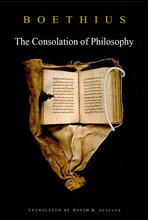
철학이 주는 위안 (The Consolation of Philosophy) 영어로 읽는 명작 시리즈 479
- 저자<보이티우스 (Boethius)> 저
- 출판사부크크
- 출판일2017-03-20
- 등록일2018-12-11
- SNS공유


- 파일포맷EPUB
- 파일크기1MB
- 공급사YES24
-
지원기기
PC
PHONE
TABLET
프로그램 수동설치
전자책 프로그램 수동설치 안내
아이폰, 아이패드, 안드로이드폰, 태블릿,
보유 1, 대출 0,
예약 0, 누적대출 0, 누적예약 0
책소개
The Consolation of Philosophy (Latin: De consolatione philosophiæ) is a work by the sixth-century philosopher Boethius that has been described as having had the single most important influence on the Christianity of the Middle Ages and early Renaissance and as the last great work of the Classical Period.The Consolation of Philosophy was written in AD 523 during a one-year imprisonment Boethius served while awaiting trial ? and eventual execution ? for the alleged crime of treason under the Ostrogothic King Theodoric the Great. Boethius was at the very heights of power in Rome and was brought down by treachery. This experience inspired the text, which reflects on how evil can exist in a world governed by God (the problem of theodicy), and how happiness can be attainable amidst fickle fortune, while also considering the nature of happiness and God. It has been described as "by far the most interesting example of prison literature the world has ever seen."[4]
A link to Christianity is often assumed, yet there is no reference made to Jesus Christ or Christianity or any other specific religion other than a few oblique references to Pauline scripture, such as the symmetry between the opening lines of Book 4 Chapter 3 and 1 Corinthians 9:24. God is however represented not only as an eternal and all-knowing being, but as the source of all Good.
Boethius writes the book as a conversation between himself and Lady Philosophy. She consoles Boethius by discussing the transitory nature of fame and wealth ("no man can ever truly be secure until he has been forsaken by Fortune"), and the ultimate superiority of things of the mind, which she calls the "one true good". She contends that happiness comes from within, and that one's virtue is all that one truly has, because it is not imperilled by the vicissitudes of fortune.
Boethius engages questions such as the nature of predestination and free will, why evil men often prosper and good men fall into ruin, human
목차
판권 페이지초판 Cover & story
■ The Consolation of Philosophy
PREFACE.
PROEM.
VERSE INTERLUDES.
● BOOK I. THE SORROWS OF BOETHIUS.
SONG I. Boethius' Complaint.
SONG II. His Despondency.
SONG III. The Mists dispelled.
SONG IV. Nothing can subdue Virtue.
SONG V. Boethius' Prayer.
SONG VI. All Things have their Needful Order.
SONG VII. The Perturbations of Passion.
● BOOK II. THE VANITY OF FORTUNE'S GIFTS
SONG I. Fortune's Malice.
SONG II. Man's Covetousness.
SONG III. All passes.
SONG IV. The Golden Mean.
SONG V. The Former Age.
SONG VI. Neros' Infamy.
SONG VII. Glory may not last.
SONG VIII. Love is Lord of all.
● BOOK III. TRUE HAPPINESS AND FALSE.
SONG I. The Thorns of Error.
SONG II. The Bent of Nature.
SONG III. The Insatiableness of Avarice.
SONG IV. Disgrace of Honours conferred by a Tyrant.
SONG V. Self-mastery.
SONG VI. True Nobility.
SONG VII. Pleasure's Sting.
SONG VIII. Human Folly.
SONG IX.[I] Invocation.
SONG X. The True Light.
SONG XI. Reminiscence.[J]
SONG XII. Orpheus and Eurydice.
● BOOK IV. GOOD AND ILL FORTUNE.
SONG I. The Soul's Flight.
SONG II. The Bondage of Passion.
SONG III. Circe's Cup.
SONG IV. The Unreasonableness of Hatred.
SONG V. Wonder and Ignorance.
SONG VI. The Universal Aim.
SONG VII. The Hero's Path.
● BOOK V. FREE WILL AND GOD'S FOREKNOWLEDGE.
SONG I. Chance.
SONG II. The True Sun.
SONG III. Truth's Paradoxes.
SONG IV. A Psychological Fallacy.[R]
SONG V. The Upward Look.
EPILOGUE.
저자 사진 및 프로필
원서로 읽는 세계 명작 시리즈
부록 (Clarissa, Volume 1 (of 9)
cover
초판 Cover & story
Clarissa, Volume 1 (of 9)
저자 사진 및 프로필















